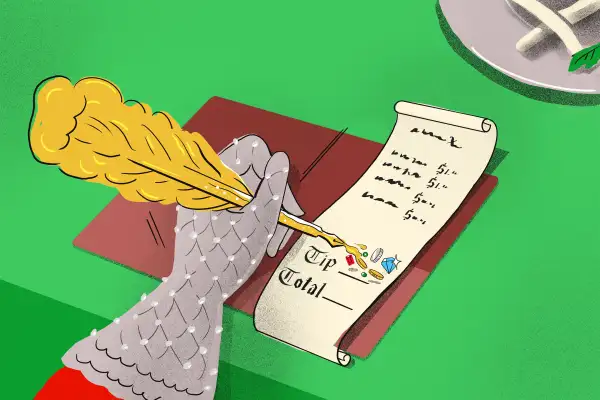Help! I Think I'm a Bad Tipper. What Are the Rules for Ubers and Coffee Shops?

Welcome to Dollar Scholar, a personal finance newsletter written by a 27-year-old who’s still figuring it out: me.
Every week, I talk to experts about a money question I have, whether that’s “What if I don't have a 401(k)? or “How many credit cards do I need?” As I learn, I share simple ways to improve your financial life… and post cute dog photos.
This is (part of) the 19th issue. Check it out below, then subscribe to get future editions of Dollar Scholar every Wednesday.
I don't believe in the concept of guilty pleasures — people shouldn't feel ashamed of anything they enjoy — but if I did, one of my guiltiest would be taking Ubers.
Not the brand Uber, specifically; I use that as an umbrella term for all the ride-hailing apps targeted at city dwellers like me. No matter the service, I take cars a lot: when I'm tired, when it's cold, when I'm upset, when my destination is far away, when I've had a few too many rum and Cokes… you get the idea.
It's a luxury, but I love it. Unlike taking the subway, getting driven around makes me feel posh and put-together. I can make calls in transit. I don't have to walk. Best of all, I can Snapchat the skyline as I zoom across the Brooklyn Bridge.
However, as frequently as I live the black car lifestyle, I'm still unclear on what to do about tipping. Of course I'll leave a couple of dollars if a driver has to wait on me or backtrack across Miami because I left my purse at a bacon-themed brunch spot (yes, this happened), but I'm clueless about the protocol otherwise.
Actually, it's not just Ubers. I don't know much about when and when not to tip in general. I know to leave 20ish% at restaurants, but I'm lost when it comes to the nuances of paying gratuities in other scenarios. Like, am I a good tipper?
I took my questions to etiquette expert Diane Gottsman, the founder of the Protocol School of Texas. Gottsman said that, with a couple of exceptions, I should err on the side of caution when tipping.
That's because many workers rely on tips as part of their income. According to the U.S. Department of Labor, if someone regularly earns more than $30 a month in tips, their employer can pay them $2.13 an hour (as long as they reach the federal minimum wage when gratuities are added; state laws vary). For people like servers and bartenders, the money I'm leaving isn't icing on the cake — it is the cake.
Gottsman said 15% to 18% is typically the minimum for average to good service, though I can bump my tip up to 20% or more if I had a great experience. She then brought up an interesting point: I'm not just tipping for services already rendered. I'm also planning for the future.
"If you get your hair done every month at the same place, you're probably going to want to build a different relationship with them versus someone you're never going to see again," she says. "You're tipping so they can fit you in when you need a last-minute cut."
Exact amounts vary by industry and the situation at hand. According to the Emily Post Institute, 10% to 15% is OK for food I'm getting delivered, though $2 to $5 is standard for pizza. I can skip the tip for hotel concierges who simply answer questions, but if they book me reservations I should fork over $5 to $10. For taxis, I should leave 15% to 20% of the fare.
Sound complicated? That's because it is.
There are several factors that affect how much customers tip. It can be generational — surveys have found that millennials are notoriously bad at it, with one in three confessing to routinely leaving less than 15% — and locational — people in the Northeast tend to give bigger tips. Even the presence of free candy with the bill can influence the tip amount.
In Gottsman's experience, tipping is most often influenced by budget. But, as she puts it, "if you're struggling with a tip, then you really are probably struggling with the price point."
Basically, not tipping because I'm feeling cheap is not an option.
If a waiter mistakenly drops a plate of spaghetti on me but apologizes profusely and gives me a dry cleaning coupon, I should still tip. If I feel a server was using unprofessional language during dinner, I can respectfully ask to speak to the manager… but I should still tip.
"If you're not leaving a tip, something really terrible happened," Gottsman says.
The bottom line is that I'm an OK tipper, but I need to do it more regularly when taking Ubers.
Now, about those exceptions. Gottsman said I shouldn't be compelled to leave a tip if my interaction is purely transactional (think: a barista pouring a cup of coffee and then flipping an iPad around with tip options). Also, not everyone is allowed to get tips (for example, U.S. Postal Service workers are prohibited from accepting cash, checks and gift cards).
To that end, I should probably review some tipping guides to make sure I'm taking the polite and appropriate path, especially as the holidays approach.
